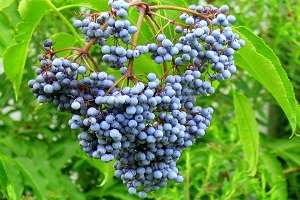By Ben Faber
An increasingly sought after health product are the fruit and flowers of elderberry – Sambucus mexicana. It is a nutraceutical which has more antioxidants than other dark fruit like blackberry and pomegranate. It's a California native, but it is estimated there may 30 species worldwide. And some are not that edible because of hydrogen cyanide which can lead to displeasing reactions. The bulk of production is in Europe – Hungary, Germany, France and much of the other countries. They make, jams, wines, topping for yogurt, pies and other tasty things. Most of the elderberry that comes into the US comes from Europe. Oregon used to have large commercial plantings, but the big players today are Missouri, Arkansas, Kentucky and Minnesota. Rather than selling pills made of elderberry, growers are finding consumers want the juice.
It's hard to find statistics on elderberry – acreage, sales, number of growers, etc. - but it's a growing industry, with varietal selections and a harvesting machine developed. The trees get to about 30 feet in height, handle drought and wet feet, alkaline soil. They are attractive to bees and other beneficials. The fruit is attractive to birds which might be a food safety issue. It would also bring back some windbreaks that have disappearing.
To read more about the potential market go to:
Elderberry Market Research - Center for Agroforestry
www.centerforagroforestry.org/profit/elderberrymarketreport.pdf

Source: ucanr.edu